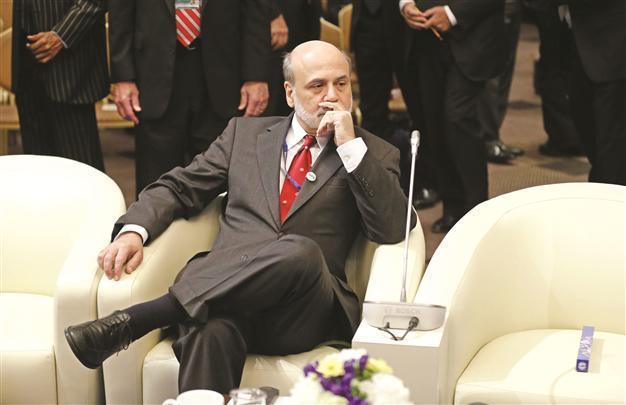Fed supports easing policies
Washington -Associated Press

US Federal Reserve Chairman Ben Bernanke is seen at the annual meetings of the IMF and the World Bank in Tokyo. REUTERS photo
Chairman Ben Bernanke is rejecting arguments that the Federal Reserve’s bold moves to bolster U.S. job growth could have unwanted consequences in emerging market countries.
In a speech on Oct. 14, Bernanke disagreed with criticism that the Fed’s efforts to drive U.S. interest rates lower could result in higher inflation in emerging markets or trigger a destabilizing flood of investment money into those nations.
In fact, he said, the efforts of the Fed and the central banks of other industrial countries should benefit the global economy by boosting growth and providing stronger markets for the goods of developing nations.
Bernanke’s speech in Tokyo was at a conference sponsored by the Bank of Japan and the International Monetary Fund.
At its September meeting, the Fed announced it was launching a program to buy $40 billion each month in mortgage-backed securities as a way to drive interest rates lower and give a boost to the housing market. Increased home sales could help spur hiring and accelerate economic growth.
The Fed also extended its time frame for keeping rates low to at least mid-2015 and said rates would remain low even after the U.S. economy begins growing at a stronger pace. That effort will continue until it sees substantial gains in the U.S. job market, the Fed said. In his speech yesterday, Bernanke said the Fed’s effort “not only helps strengthen the U.S. economic recovery, but by boosting U.S. spending and growth, it has the effect of helping support the global economy as well.”
Some foreign officials have been critical of the Fed’s policy, arguing that extraordinarily low U.S. interest rates will end up giving the United States trade advantages by weakening the value of the U.S. dollar. A cheaper dollar makes U.S. goods less expensive in other countries.
But Bernanke said that the dollar’s value against the currencies of emerging market economies has changed little during the Fed’s prolonged period of credit easing in the U.S.
Bernanke also disputed criticism that low interest rates in the U.S. and other industrial nations were contributing to destabilizing investment flows to emerging economies that could make inflation worse in those nations.
‘Policies do not dictate capital flows’He said he does not believe that interest-rate polices at the Fed and other developed nations dictate capital flows. Bernanke said there are ways that developing nations can control these flows to prevent asset bubbles or higher inflation. A nation could allow the value of its currency to rise as foreign capital flows in. But Bernanke said that some emerging market economies have chosen to keep the value of their currencies low to gain trade advantages.
